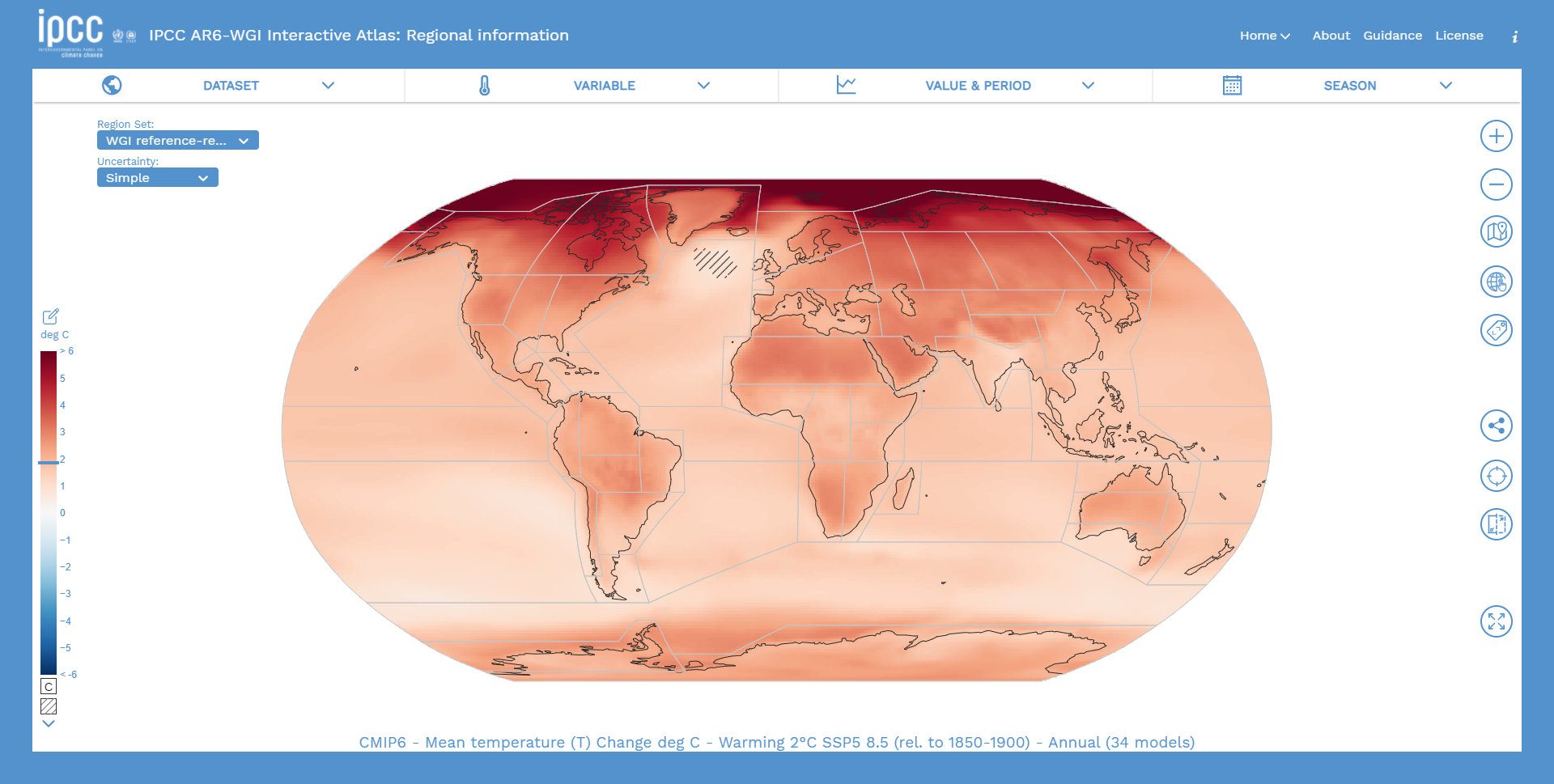- The new IPCC report, released today, reveals that global warming is already affecting all regions of the world.
- The new online tool groups a large volume of data, provides regional information and analyzes the results of the report to develop policies on climate change.
August 9, 2021
A team of IFCA researchers in a public-private collaboration with the Spanish company Predictia has developed a web service for climate information from regions around the world. It allows to obtain projections on different levels of global warming in orther to know how climate change is affecting different regions of the planet.
This new tool, called Interactive Atlas, is one of CSIC's main contributions to the Sixth Assessment Report (AR6) of the Intergovernmental Panel on Climate Change (IPCC), which was presented online today at the headquarters of the World Meteorological Organization in Geneva. The report includes the participation of CSIC researchers José Manuel Gutiérrez and Sergio Vicente Serrano and warns: if measures are not adopted, the limit of the increase in global average temperature (1.5ºC) of the Paris agreement will soon be exceeded.
The main novelty of the sixth IPCC report is its regional approach, which analyzes how climate change is affecting different regions of the world. Throughout four chapters, the document studies the challenges posed by the regional analysis of climate change and studies the climatic phenomena that generate impacts, with special attention to extreme phenomena, region by region. The report analyzes the recent trends of these phenomena and also their future projections for different scenarios. This analysis reveals that climate change is already affecting all regions of the world and increases the likelihood of different combinations of extreme weather events, such as heavy rainfall or heat waves, specific to each region of the world. The forecast is that, with greater global warming, all regions will experience more and more simultaneous and multiple changes in the different extremes and climate impact factors analyzed. These changes would be more general after 2ºC, compared to global warming of 1.5ºC.

The Interactive Atlas synthesizes all climate changes region by region, using a new set of 46 land and 12 ocean regions. / IPCC
The Interactive Atlas, developed by IFCA researchers and the technology-based company Predictia, provides access to regional information and analyzes the main results of the report to help develop future policies on climate change. The Atlas provides access to a wide variety of climate information (maps, series, tables, etc.) post-processed from data from organizations such as the Earth System Grid Federation (ESGF) or the Copernicus Climate Change service. In addition, it synthesizes all climate changes region by region, using a new set of 46 land and 12 ocean regions that can be consulted online for free.
The development of the Interactive Atlas has been led by José Manuel Gutiérrez, Director of the Instituto de Física de Cantabria (IFCA), a joint center of the CSIC and the University of Cantabria, in collaboration with the Predictia company. For his part, Sergio Vicente Serrano, from the Pyrenean Institute of Ecology (IPE-CSIC), has authored Chapter 11 of the sixth IPCC report, in which extreme phenomena and, in particular, droughts are analyzed. Along with Gutiérrez and Vicente, two other Spanish researchers participate in the IPCC report: Sergio Faria, from the Basque Center for Climate Change and Francisco Doblas, from the Barcelona Supercomputing Center.
The Sixth IPCC Report presented today studies the physical bases of climate change. It is the first report of the three working groups that are part of the IPCC activity. “The preparation of this report has involved more than three years of research, during which all the scientific literature, data and projections of existing models have been reviewed, culminating in a two-week approval phase, in which
the delegations of the 195 member countries have approved the report by consensus ”, explains Gutiérrez. For their part, the reports of working groups 2 and 3, corresponding to impact and adaptation, and mitigation measures, respectively, are developed in parallel and will be presented throughout 2022.
CSIC Climate Platform
CSIC has given human and technical support to the development of the Interactive Atlas within the framework of the Interdisciplinary Thematic Platform Climate and Climate Services (PTI-Climate) of CSIC. The Atlas, which arises from the public-private collaboration between CSIC and the Spanish technology-based company Predictia, is a new web tool that allows a flexible spatial and temporal analysis of climate results through different parameters, such as, for example, future projections for different scenarios or levels of global warming.
The Interactive Atlas includes two components: the regional information (which provides access to climate change data from the main sets of figures used in the report), and the regional synthesis (which summarizes and synthesizes the main results of the assessment report). regional climate change for different types of phenomena: heat, droughts, sea level ...). All of this makes the Atlas not only supportive of the chapters of the report, but also of the summary for policy makers.
The presentation in Spain of the Sixth IPCC report is scheduled for September through a conference coordinated by the Spanish Office for Climate Change (OECC) and with the participation of national authors. The event will also be attended by representatives of the OECC and the State Meteorological Agency (AEMET). In addition, the final version of the Interactive Atlas is scheduled to be presented on September 27 at an IPCC press conference to be held in Spain and will be attended by the Third Vice President of the Government and Minister of Ecological Transition, Teresa Ribera.
